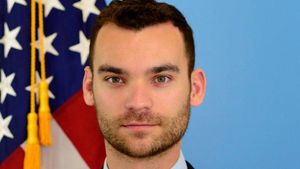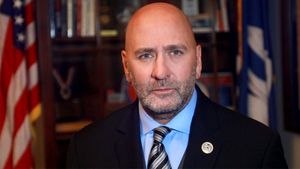Treatment GuideJust DiagnosedSex & DatingAfrican AmericanStigmaAsk the HIV DocPrEP En EspañolNewsVoicesPrint IssueVideoOut 100
CONTACTCAREER OPPORTUNITIESADVERTISE WITH USPRIVACY POLICYPRIVACY PREFERENCESTERMS OF USELEGAL NOTICE
© 2025 Pride Publishing Inc.
All Rights reserved
All Rights reserved
By continuing to use our site, you agree to our Privacy Policy and Terms of Use.
Mary had been happily married for five years when her husband suddenly became ill with pneumonia. Initially his doctors could not understand why he was sick. Bt then they tested him for HIV antibodies. It was 1994, and Mary and her husband, both Latino, were living in San Antonio. 'At that time HIV was seen as a white man's disease,' Mary, who requests that her last name not be used, says. 'We were monogamous, and I never thought HIV would affect us. But he had been an IV drug user before we met, and he never told me about it. By the time he was diagnosed, he had AIDS. The next day they tested me. A week later I found out I was positive.' Eight months after Mary's husband was diagnosed with AIDS, he died. But Mary did not have to face his death alone. She was able to find support at Mujeres Unidas Contra el SIDA (Women United Against AIDS), an organization in San Antonio for Latinas who are either infected or affected by HIV. Mujeres Unidas offers support groups for women and their families, programs for their children, and information about preventing HIV infection and staying healthy after a diagnosis. For instance, one of the programs at Mujeres Unidas, called Madrinas, or godmothers, pairs HIV-positive women with newly diagnosed women or women whose loved ones have been recently diagnosed. Like Mary, most of the women in the group share similar stories of husbands or boyfriends who concealed injection-drug use, hid their sexual relationships with other men, or promised monogamy but brought home HIV. 'What brought these women together,' says Yolanda Rodriguez-Escobar, founder and executive director of Mujeres Unidas, 'was that they were all dealing with a sense of betrayal.' Overload of Emotions, Responsibilities This type of betrayal can lead to a large amount of resentment and anger. 'Some women will resolve these feelings,' Rodriguez-Escobar says, 'but the majority won't because when they find out their partner infected them, everything snowballs. Typically, they end up becoming caregivers for their partner, and they don't address how they feel until their partner is gone.' For these women, the psychological impact of an HIV diagnosis can take years to overcome. 'There is a whole set of women who don't have a clue that their male partners have outside relationships,' says Sally Dodds, Ph.D., an associate professor of clinical psychiatry at Florida's University of Miami and an AIDS researcher. 'And when they learn that they are HIV-positive, there is the shock that he had an outside affair, plus the shock of HIV infection and the fear and the rage that that brings up.' Nancy Owens was 26 and engaged to be married when she found out she was infected with HIV. 'I lost my mind,' Owens says. 'It was devastating. I thought the guy I loved wouldn't want to be with me. I thought I was going to die.' The couple still took that walk down the aisle. But for Owens, the future was intricately tied to the past'and the old boyfriend who she now realized had infected her with HIV. 'Prior to being with him I was very protective about having sex and using condoms,' she says. 'But because I was in a relationship, it made me feel that it was OK to do it unprotected. Toward the end of the relationship I started realizing he had had sex with men. But I hadn't known that before.' When Owens, now 35, first learned she was HIVpositive, she did not know any other women infected with HIV. But over time she became active in HIV education; in March she began facilitating a group for HIV-positive women at Parkway United Methodist Church in Boston. 'A lot of women who have gotten HIV from their spouses are trying to fight the stereotype that they used drugs,' she says. 'The last thing people think is that a woman got it from her husband or boyfriend.' Finding a Path for Release Group and individual counseling play important roles in helping women move past the betrayal they have experienced. 'Often the person who was betrayed tries to figure out what she did wrong,' Dodds says. 'It is important that women learn to express their anger and put the blame where it needs to be.' After that, she says, women need to learn how 'to see their own strengths.' Then they are ready to learn anew 'how to date, how to build a relationship, and how to establish trust and intimacy before starting to negotiate sex.' Although some women do go on to be able to trust a partner again, many do not. 'It's hard enough to meet someone new,' says Dodds. 'It's even harder to disclose that you are HIV infected. So we find an awful lot of women we work with turn away from male partners and find better support and have stronger ties with their own families, girlfriends, or with other HIV-infected women.' Mary, now 49, knows those feelings all too well. 'After what happened I didn't want to go out anymore,' she says. 'I didn't want to fall in love with someone, tell him I was infected, and then never see him again. But I'm here to say that there is life after an HIV diagnosis. My neighbor and I became good friends. He knew I had HIV, and he'd cook for me and bring me healthy stuff to eat. And slowly we fell in love.' Mary and her new partner have been together for five years. But that does not mean she no longer needs her support group. 'He knows that Thursday is Mujeres night,' she says. 'I need to be there, and so he makes other plans.'
From our Sponsors
Most Popular
BREAKING: Supreme Court rules to save free access to preventive care, including PrEP
June 27 2025 10:32 AM
“So much life to live”: Eric Nieves on thriving with HIV
September 03 2025 11:37 AM
Thanks to U=U, HIV-positive people can live long, happy, healthy lives
July 25 2025 2:37 PM
The Talk: Beyond the exam room
August 13 2025 3:15 PM
Messenger RNA could be the key to an HIV vaccine — but government cuts pose a threat
August 20 2025 8:02 AM
Plus: Featured Video
Latest Stories
Amazing People of 2025: Javier Muñoz
October 17 2025 7:35 PM
It’s National PrEP Day! Learn the latest about HIV prevention
October 10 2025 9:00 AM
“I am the steward of my ship”: John Gibson rewrites his HIV narrative
September 16 2025 2:56 PM
The Talk: Owning your voice
August 25 2025 8:16 PM
The lab coat just got queer
August 21 2025 10:00 AM
The Talk: Navigating your treatment
August 01 2025 6:02 PM
The Talk: Starting the conversation
July 25 2025 4:47 PM
How the Black AIDS Institute continues to fill in the gaps
July 25 2025 1:06 PM
“I felt like a butterfly”: Niko Flowers on reclaiming life with HIV
July 23 2025 12:22 PM
Dancer. Healer. Survivor. DéShaun Armbrister is all of the above
July 02 2025 8:23 PM
1985: the year the AIDS crisis finally broke through the silence
June 26 2025 11:24 AM
VIDEO: A man living with HIV discusses his journey to fatherhood
June 10 2025 4:58 PM
Trump admin guts $258 million in funding for HIV vaccine research
June 03 2025 3:47 PM
Grindr is reminding us why jockstraps are so sexy and iconic
May 02 2025 5:36 PM
HRC holds 'die-in' to protest Trump health care cuts
April 28 2025 2:11 PM
Two right-wing Supreme Court justices signal they may uphold access to PrEP and more
April 21 2025 4:10 PM
500,000 Children at Risk: PEPFAR Funding Crisis
April 08 2025 3:51 PM




































































